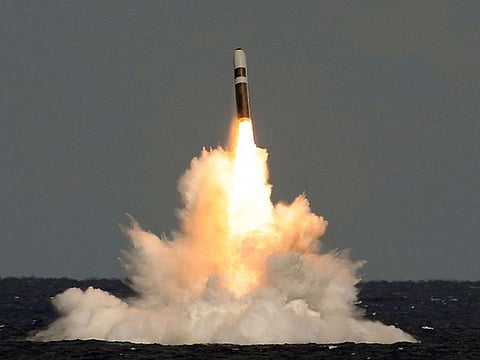UK has 'confidence' in nuclear system despite misfire
Defence minister Grant Shapps admitted to parliament that an anomaly did occur

London: The UK government said Wednesday that it had "absolute confidence" in its Trident nuclear deterrent system despite a reported missile test failure.
Defence minister Grant Shapps admitted to parliament that "an anomaly did occur" during an exercise on January 30, following reports that a missile fired from the submarine HMS Vanguard fell into the sea.
Shapps said in the written statement that it was "longstanding practice" not to comment on such tests, but that it was providing information "in recognition of the level of interest" in the operation.
"On this occasion, an anomaly did occur, but it was event specific and there are no implications for the reliability of the wider Trident missile systems and stockpile," insisted the minister, who was on board the vessel at the time of the test.
"Nor are there any implications for our ability to fire our nuclear weapons, should the circumstances arise in which we need to do so."
The Sun newspaper reported on Wednesday that the "first-stage" boosters on the dummy Trident 2 missile did not ignite when fired off the coast of Florida, with an anonymous source saying, "it just went plop, right next to them".
It is believed to be the second failed launch in a row.
Despite the setback, Shapps said that the test "reaffirmed the effectiveness of the UK's nuclear deterrent, in which the government has absolute confidence.
"The Trident missile system remains the most reliable weapons system in the world, having successfully completed more than 190 tests," he added.
"The UK's resolve and capability to use its nuclear weapons, should we ever need to do so, remains beyond doubt."
But the opposition Labour party called the reports "concerning".
The 13-metre-long Trident missile, which can aim at targets up to 4,000 miles away, are fired underwater from submarines, with boosters supposed to ignite when the weapons reach the surface.
Each Vanguard-class submarine can hold eight Trident rockets, but they are due to be replaced in the 2030s by the larger Dreadnought-class of vessels.



